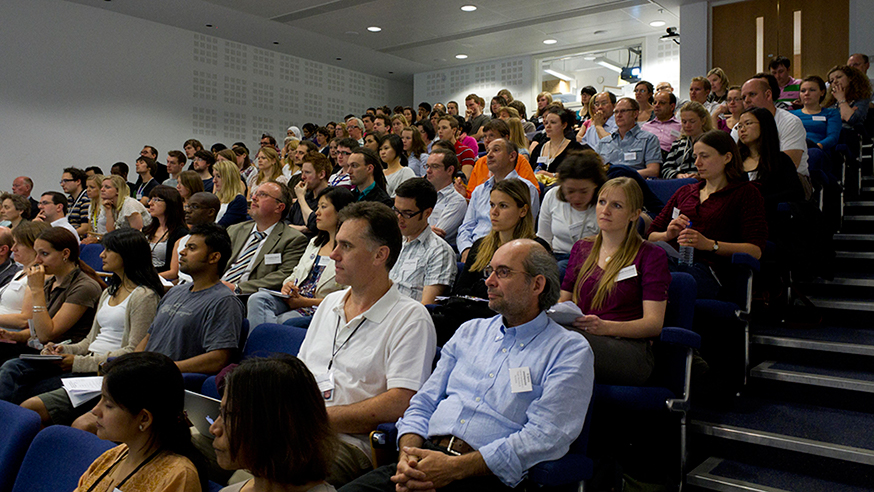
Attendees listen to a presentation at a conference
The American Society of Clinical Oncology (ASCO) Annual Meeting brings together a diverse mix of clinicians and healthcare professionals to shape the future of cancer prevention, diagnosis, treatment and care.
Scientists from The Institute of Cancer Research, London, will be out in force to share their latest discoveries with the 30,000 researchers from around the world that are expected to attend.
The theme for the 2016 ASCO Annual Meeting in Chicago is ‘Collective Wisdom: The Future of Patient-Centred Care and Research’. It highlights how combined knowledge that spans disciplines, disease sites, and treatment approaches will help shape the future of patient care.
Our research being presented at the conference certainly showcases a wide range of expertise. Several presentations focus on how the genes that we inherit can impact on cancer risk and outcomes.
Professor Ros Eeles and her team will highlight a study involving data from 89,000 men, which is looking for genetic changes that make us more likely to develop prostate cancer.
Understanding genetic drivers
Genetic testing could also benefit men who already have prostate cancer, according to another set of data from Professor Johann de Bono, Head of the Division of Clinical Studies, and colleagues being presented at one of the conference’s symposia. The research looks at the benefits of testing for genetic mutations knowns to affect DNA repair in men with metastatic prostate cancer.
A better understanding of the genetic drivers of cancer could help doctors make treatment decisions.
We also have several studies looking at new treatment options. Some offer glimpses of new approaches to cancer treatment, such as early studies targeting a protein called ATR. Many cells depend on ATR to survive DNA damage, as it regulates the cells response to stress and signals for repairs. Dr Timothy Yap is one of the senior ICR researchers investigating whether blocking ATR can help to stop tumours growing.
But it isn’t just about new treatments. Some existing treatments could benefit different patient groups.
Immunotherapy advances
For instance, scientists are studying therapies called monoclonal antibodies, which work by recognising and finding specific proteins on cancer cells so that they can be targeted and destroyed. They are already being used for skin cancer in adults, but the conference provides an opportunity to discuss their impact in children, especially in those who are not responding to current treatments.
Improving side-effects of treatment is another area of ICR research that is being presenting at ASCO. It’s great to see so many studies hoping to make treatments more patient-friendly, whether it is Professor Winette van der Graaf, Team Leader in Clinical and Translational Sarcoma research, highlighting how taking food with some medications can help to reduce side-effects, or a complex analysis of 1,002 cases of diarrhoea to identify links with some cancer therapies.
All in all, it seems like a great spectrum of research from identifying those at risk of cancer, right through to making treatments work better and smarter.
The ASCO Annual Meeting takes place in Chicago, Illinois, US, on 3–7 June 2016.
comments powered by